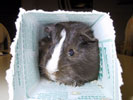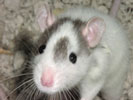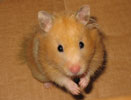Childrens corner
Choosing the Right Pet
A pet can be a source of joy, fun, and comfort for an individual or a family -- if you find the right pet. For children, pets provide unconditional love, learning opportunities, including developing a sense of responsibility, and a connection to nature.
Every person, family, and pet is unique. There is no "ideal pet" for a child of a certain age, no "one size fits all" for adults. But with a little forethought and planning, you can avoid common pitfalls and find the right pet for you or your family.
 Start With the Heart: Make a list of the types of pets that you really like.
Start With the Heart: Make a list of the types of pets that you really like.- Add Facts: Learn about a prospective pet. How long will he live? How big will he grow? How much space is needed for an indoor habitat such as a cage or aquarium? How much time each day will you spend caring for him? What kind of care? What can you expect to spend, annually, on food, veterinary expenses, or other costs? Does he shed a lot of hair? Is he sociable or aloof, noisy or quiet? Is he too frail for your young children to handle?
- Answers to these questions should help you begin to narrow your choices.
- Inventory Your Resources: Take a quick but realistic inventory of your resources and circumstances. How much time, each day, are you or family members willing to devote to pet care? How much money are you prepared to spend, not merely to acquire a pet, but to provide a healthy diet, proper equipment and any routine (e.g. vaccinations) or emergency (e.g. accidents) veterinary care? Do you have room for an indoor habitat? Space is particularly relevant when it comes to dog ownership. Local traffic flow is an important consideration for potential cat owners. If you are interested in a dog, do you have a fenced-in yard or live near a park? Who will look after the pet if you go away on holidays? Can you bring it with you or will your neighbours look after it? Will it have to go into kennels?
- Consider Special Issues: Are you or some family members allergic to certain pets? What pets are permitted under your lease agreement? Who will care for the pet when you are working late or travelling?
- If you are a parent, think about your children's ages, temperaments, interests, and physical abilities in relation to a pet. Children up to age five should not be left alone with a pet; the risk of injury -- to your child, the pet, or both -- is too great. Are you able to take on this supervisory task?
 Ready to choose? By now, you should have a fairly clear sense of: the type of pet you like; what it will take to care for this pet; whether or not you have the resources to provide such care; whether other circumstances rule out or rule in this pet. There is a wide range of appealing pets to choose from, in addition to cats and dogs. For almost every individual or family, a good match is possible.
Ready to choose? By now, you should have a fairly clear sense of: the type of pet you like; what it will take to care for this pet; whether or not you have the resources to provide such care; whether other circumstances rule out or rule in this pet. There is a wide range of appealing pets to choose from, in addition to cats and dogs. For almost every individual or family, a good match is possible.
Some quick facts:
 A dog, or even two, if you have lots of space, may be right for you if you or your family can spend a lot of time exercising and playing with a canine family member. Dogs are sociable animals, and need a lot of interaction with people. They need training and grooming, as well as food and regular veterinary care. They are great pets for individuals and families that are outdoor-orientated. Children can form very special bonds with their dogs.
A dog, or even two, if you have lots of space, may be right for you if you or your family can spend a lot of time exercising and playing with a canine family member. Dogs are sociable animals, and need a lot of interaction with people. They need training and grooming, as well as food and regular veterinary care. They are great pets for individuals and families that are outdoor-orientated. Children can form very special bonds with their dogs.
 Cats have replaced dogs as England’s most popular pets. This reversal is no doubt due to today's hectic lifestyles -- and cats, unlike dogs, do not need to be walked outside. A cat or two may be a good choice if you want a quiet, indoor pet. They like human company and attention, and can be quite affectionate. They need regular meals, grooming, a clean litter box, toys and a window on the world. If you have children under age six, an adult cat is a better choice than a kitten. If you feel uncertain about making a twenty-year commitment to this long-lived pet, adopt an older cat that is used to being with children.
Cats have replaced dogs as England’s most popular pets. This reversal is no doubt due to today's hectic lifestyles -- and cats, unlike dogs, do not need to be walked outside. A cat or two may be a good choice if you want a quiet, indoor pet. They like human company and attention, and can be quite affectionate. They need regular meals, grooming, a clean litter box, toys and a window on the world. If you have children under age six, an adult cat is a better choice than a kitten. If you feel uncertain about making a twenty-year commitment to this long-lived pet, adopt an older cat that is used to being with children.
 Small Mammals include fancy mice and fancy rats; ferrets; gerbils; guinea pigs; hamsters; rabbits. They should be bought at a young age and handled regularly. These adorable little creatures, residing in a cage or tank, are becoming increasingly popular, but sometimes for the wrong reason: people mistakenly think that an animal that lives in a contained habitat is low-maintenance. In fact, ferrets and rabbits require nearly as much time and attention (and exercise outside the cage) as dogs. All of these pets need daily human attention, some need company of their own kind, and most should not be life inside their habitat full-time. In addition to feeding and handling, care chores include thoroughly cleaning the pet habitat. Your child will realise that he/she cannot forget about and neglect Sammy or Sammy will die. Children also learn that the more that they give to a pet, in time and love, the more they get back in return. Most of these "small furries" are very responsive to handling and with gentle human contact from an early age, can become very affectionate.
Small Mammals include fancy mice and fancy rats; ferrets; gerbils; guinea pigs; hamsters; rabbits. They should be bought at a young age and handled regularly. These adorable little creatures, residing in a cage or tank, are becoming increasingly popular, but sometimes for the wrong reason: people mistakenly think that an animal that lives in a contained habitat is low-maintenance. In fact, ferrets and rabbits require nearly as much time and attention (and exercise outside the cage) as dogs. All of these pets need daily human attention, some need company of their own kind, and most should not be life inside their habitat full-time. In addition to feeding and handling, care chores include thoroughly cleaning the pet habitat. Your child will realise that he/she cannot forget about and neglect Sammy or Sammy will die. Children also learn that the more that they give to a pet, in time and love, the more they get back in return. Most of these "small furries" are very responsive to handling and with gentle human contact from an early age, can become very affectionate.
 Hamsters can become very affectionate if bought at a young age and handled frequently and gently. Their only downside is that they can sometimes if handled roughly give a little nip! They are nocturnal creatures, which is also a disadvantage as they are most active when the children are asleep! Children love these small, furry pets, however it should be mentioned that children up to age eight may lack the muscle control to handle them, and it can be all too easy, and traumatic, for a child to inadvertently injure one of these beloved pets.
Hamsters can become very affectionate if bought at a young age and handled frequently and gently. Their only downside is that they can sometimes if handled roughly give a little nip! They are nocturnal creatures, which is also a disadvantage as they are most active when the children are asleep! Children love these small, furry pets, however it should be mentioned that children up to age eight may lack the muscle control to handle them, and it can be all too easy, and traumatic, for a child to inadvertently injure one of these beloved pets.
 Birds can be charming, endearing companions. They are intelligent, sociable, and often amusing. Unless you get two lovebirds, two canaries, or several finches (who will then bond with each other, rather than with you), birds require substantial human interaction, including time outside the cage, which can be messy. Like all pets, they need daily care.Children under the age of eight usually have not developed the patience or gentleness to safely handle these fragile animals.
Birds can be charming, endearing companions. They are intelligent, sociable, and often amusing. Unless you get two lovebirds, two canaries, or several finches (who will then bond with each other, rather than with you), birds require substantial human interaction, including time outside the cage, which can be messy. Like all pets, they need daily care.Children under the age of eight usually have not developed the patience or gentleness to safely handle these fragile animals.
 Fish may be the pets for you if you or your family is pressed for time. An aquarium is a miniature ecosystem that often fascinates children and adults alike. Setting up an aquarium can be time-consuming, but daily feeding takes only a moment, and weekly maintenance can be accomplished in less than an hour. For children a freshwater tank is recommended (either cold, or tropical), and offers opportunities to nurture a wide variety of fish.
Fish may be the pets for you if you or your family is pressed for time. An aquarium is a miniature ecosystem that often fascinates children and adults alike. Setting up an aquarium can be time-consuming, but daily feeding takes only a moment, and weekly maintenance can be accomplished in less than an hour. For children a freshwater tank is recommended (either cold, or tropical), and offers opportunities to nurture a wide variety of fish.
 Exotic, Alternative or Non-traditional Pets, including most reptiles and amphibians, often appeal to children, especially teens. But, according to an article in Petlife magazine, "Most people who end up owning an alternative pet shouldn't. Invariably the demands of upkeep prove too gruelling or the novelty simply wears off." Non-traditional pets of all kinds are harder, and generally more expensive, to care for. It is difficult to find veterinarians trained in these specialties, and difficult to find reliable information about their care. The transmission of salmonella bacteria from reptiles to humans is a serious health issue. Most individuals and families are wise to choose a more traditional pet. Don't Forget to Have Fun! The process of choosing a pet can be fun, and the rewards are many. Remember, one can always take one step at a time. Try getting a goldfish or a hamster and if they get properly looked after then you can think about getting a dog or cat.
Exotic, Alternative or Non-traditional Pets, including most reptiles and amphibians, often appeal to children, especially teens. But, according to an article in Petlife magazine, "Most people who end up owning an alternative pet shouldn't. Invariably the demands of upkeep prove too gruelling or the novelty simply wears off." Non-traditional pets of all kinds are harder, and generally more expensive, to care for. It is difficult to find veterinarians trained in these specialties, and difficult to find reliable information about their care. The transmission of salmonella bacteria from reptiles to humans is a serious health issue. Most individuals and families are wise to choose a more traditional pet. Don't Forget to Have Fun! The process of choosing a pet can be fun, and the rewards are many. Remember, one can always take one step at a time. Try getting a goldfish or a hamster and if they get properly looked after then you can think about getting a dog or cat.



